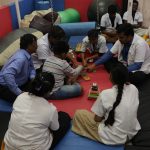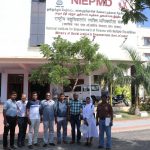Caritas India’s Community Based Rehabilitation Forum (CBRF) had given the opportunity to 6 delegates from Caritas Sri Lanka to visit Chennai to learn about what is happening to differently abled and how India handles them. The delegates had the opportunity to experience the mechanism at village level, intermediary level and the governmental level.
CBRF has established partners in different parts of India and the partners are working with Persons with Disabilities (PwDs). The team visited one such partner, ‘Integrated Rural Community Development Society’ (IRCDS) in Thiruvallur. IRCDS has formed ‘Differently abled People’s Organizations’ (DPO) in the villages and has capacitated DPO members through meetings, awareness programmes and workshops. DPOs look into the welfare and livelihood of its members. They also train them on sustainability and financial self-sufficient by using methods such as ‘Rolling Funds’. ‘Vasanatham’ is one of ‘District Differently abled People Organizations’ (DDPO) working closely with IRCDS. In Vasantham’s general body there are 42 members and they cover 315 villages in Tamil Nadu where 10000 PwDs are benefitted.
As far as the government is concerned, the Collectors Office in Chennai has taken the lead by helping the PwDs. Empowerment of PwDs is their main task. The Collectors Office also donates INR 1000/- for each PwD monthly, offer scooters, provide job opportunities in the government sector as well as private sector and render early diagnosis and physiotherapy services. Collectors Office organize awareness programmes for its own staff in handling PwDs. ‘Special Grievance Day’ is organized once a month where PwDs will be able to talk to officials directly about their grievances.
Most interesting part of the visit was the ‘National Institute for Empowerment of Persons with Multiple Disabilities’ (NIEPMD) in Chennai. NIEPMD is a governmental institution and situated in Muthukadu in the outskirts of Chennai. The multistoried building in the sprawling campus is barrierless and PwDs could access any floor with greatest ease as all the floors are equipped with lifts, ramps and tactile paving for the visually impaired.
An audience was given by Dr. A. Amaranath, a lecturer at the institute who was deputizing for the director. He briefed the delegates on the activities they carry out and the benefits they offer for PwDs. NIEPMD provide only rehabilitation services to PwDs. They do not provide medical services. It also provides allowances as well as equipment free of charge to PwDs. Expensive items such as prosthetic and orthotic equipment are also provided free of charge as the centre has its own workshop to manufacture them. NIEPMD’s in-house training schemes trains the staff as handling PwDs is a special profession. Undergraduate students are also enrolled for many degree programmes. NIEPMD provides professional training in handling PwDs to NGOs and institutions, local or international at a nominal rate. The team visited all the sections/departments; Early Childhood, Prosthetics and Orthotics, Early Intervention, Sensory Integration, Speech Hearing and Communication and Neuro Development Therapy.
Caritas Sri Lanka has already implemented a project to ensure the rights of the children with disabilities and their parents/caregivers in Mannar and Vanni dioceses. The delegation comprised of Caritas Directors and Project Officers from Mannar and Vanni. The delegates obtained valuable inputs in handling the PwDs from this fruitful visit to Chennai.



